The Democracy of Curiosity
My wife and I recently had dinner with a couple in our neighborhood whose kids are about the same age as ours and who share many of our interests. They also have a good sense of humor, part of the foundation of any good friendship, so our families get together not infrequently. But this particular occasion was notable for its—how shall I put it—lively after-dinner conversation. Whether it was due to our hectic work and school schedules, the approaching midterm elections, the impending winter, or “the general din of the world,” as poet Jane Mead once wrote, that evening we questioned, challenged, and argued with one another about a wide range of topics, including politics and literature. Tensions rose, simmered, rose higher still, and cooled. It was a safe environment, so we were free to air it all out, make mistakes, push and provoke, and afterward there was a mutual feeling that we knew one another, and perhaps even ourselves, a little better.
Maybe it’s because I grew up in the seventies in rural Wisconsin, where I was taught to keep my opinions to myself, where humility was planted in me with the same regularity as the corn and alfalfa that grew in the fields surrounding our house—or simply because I’m a writer who is protective of his time—but I usually need some coaxing to go out on a Saturday night and chat for six hours. And that’s sad, really, because I know full well that right now, as writers, as citizens, as human beings, we need to break out of the protective bubble we build around ourselves and talk.
Readers will notice that two of the features in this issue run under a headline with variants of that very word in it. In “Talking to Strangers”, Kate Tuttle shows how nonfiction writer Susan Orlean has made an entire career of doing exactly that. Tuttle writes, “Her approach is to lead with what she calls ‘the democracy of curiosity,’ the idea that the people she interviews know more about their own lives than she will ever know.” Now that’s a concept we could all apply to our own work a little more often.
And in “A Talk in the Woods”, Barbara Kingsolver and Richard Powers, two best-selling novelists who had never met, engage in one of the most thoughtful, intellectually stimulating, and inspiring conversations about the craft of writing that I’ve ever listened to—which is, of course, another amazing thing that happens when we take the time to talk to one another: We listen.







